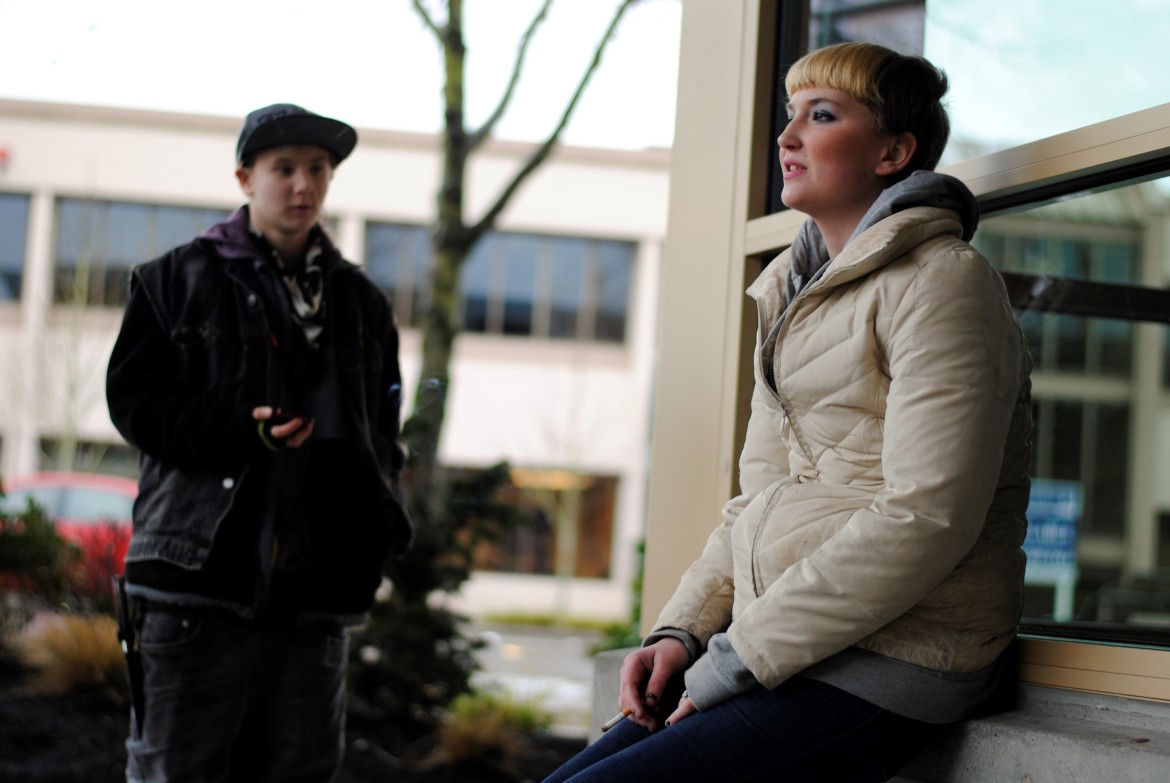
Stover E. Harger III
Kaitlyn Watson, 18, smokes a cigarette with her lifelong friend Kasey, 16, one of a handful of people Watson knows who are fixtures at the Redmond Regional Library, in the suburbs of Seattle. Watson said her criminal past has made it difficult to find work.
REDMOND, Wash. — Kaitlyn Watson’s days blur into weeks, with the unbroken cycle of a monotonous daily routine. Day in, day out, the days offer variations on a theme: Wake up. Shower. Go online. Look for jobs.
When the routine becomes tiresome, or too depressing to continue, Watson lies down and takes a nap. Or, sometimes, she’ll crack open a book. She loves to read. She hangs out with her fiance, at the place they share with his mom on the outskirts of Seattle.
His mom is a pleasant lady, Watson says, even if “she’s the kind of person who hops on your ass” about stuff. At least she’s more pleasant than her own — a woman who, in a fit of anger, Watson beat up.
The 18-year-old, with an admittedly spotty past, isn’t a typical teen. Then again, she’s not exactly alone, either. In Washington, there were 1,305 incarcerated youth in 2010, according to the U.S. Census Bureau.

Stover E. Harger III
Kaitlyn Watson
Watson was locked up in Washington’s juvenile justice system for roughly a year, the result of an assault arrest when she was 16. She turned 18 at the youth facility, called Echo Glen, before being released in May. And, while such a past might be lost to the ephemeral fog of most states’ records laws, that wasn’t the case in Washington.
The state is one of eight that allows open access to juvenile arrest records. What this means is anybody interested in performing a thorough background check — including landlords, employers, reporters, private investigators or, some worry, less savory people, such as pimps or abusive partners — can walk down to the courthouse and see whether someone ran afoul of the law as a kid.
Meanwhile, Washington’s Administrative Office of the Courts, which oversees the state’s court system, disseminates data files that include juvenile records. These, in turn, are sold to private consumer reporting companies.
Advocates say that’s a problem. For someone like Watson, who’s struggling to find work, the proliferation of such records is akin to placing a giant red asterisk on every one of her applications.
“I have to tell them, every time, that I’m a juvenile offender,” Watson said. In most cases, she noted, that’s the last she hears from an employer.
She’s applied to Victoria’s Secret and Starbucks. In return, she’s heard nary a word back. The barista job in particular sounded like a good fit, Watson said, because she had received some workforce training at Echo Glen.

Stover E. Harger III
Watson rides a friend’s longboard on Feb. 23 to the Redmond Regional Library where she planned to use the free Internet to search for jobs, which she does most days.
Without much hope for a job, which she attributes to her past, Watson doesn’t know where to begin. So for now, she’s technically homeless, a couch surfer, who relies on her 29-year-old fiance, Tony, who works everyday. They hope to get a place soon and have plans to marry this fall, when the leaves start turning colors.
Most of her days are spent at the local library, located in the center of Redmond, a Seattle suburb and the home of computer giant Microsoft. She spends hours a day there, looking for work, perusing wedding dress websites, smoking cigarettes and gabbing with other homeless people, who come inside the library to eat or rest. She’d become acquainted with them during her time on the streets.
“I know all the street kids,” she said, walking into the library wearing an off-white parka, made even more off-white by a dusting of dirt.
When she takes a break from trawling through job aggregation websites, it’s to wander down the street, through parking lots, to a small coffee shop, where the smell of pot lingers in the air. There, she visits with friends, most of whom also struggle to find work. She acknowledges that her days are a bit aimless. There haven’t been many opportunities to find guidance since the state dismissed her from Echo Glen following her eighteenth birthday.
“They just dropped me off in the middle of Seattle,” she said. “They had no legal authority over me anymore. They said, ‘Goodbye. Good luck.’’”
She still holds out hope of being able to find employment. But it can be a draining experience to always expect to hear the word “no.”
A bill in the Washington state Legislature this year is intended to help young adults put their convictions behind them and move on with their lives. House Bill 1651 aims to put a crimp on releasing juvenile records. The bill, which as of March 6 was still in the state's Senate rules committee, would restrict access to all records except the worst felony offenses, such as violent crimes and sexual assaults.
That’s a far cry from the current law, which says that for a person to seal a record, she must stay in the community for several years and pay back the state. But there’s a catch: By the time that process is done, the record is already in circulation, because it’s been picked up by third-party record collectors.
State Rep. Ruth Kagi, a Democrat who serves the north King County area, including part of Seattle, is a co-author of the bill. She introduced it last year. During that session, it exited the House unanimously before dying in the Senate.
This year, it’s up again, and Kagi is more optimistic about its future, even though it’s a short session for the Legislature. The bill faces stiff competition from some who consider it an affront to the state’s open records law, a breach of the public trust or worse. The state’s current law has been on the books since 1977, when the state revised its juvenile code. Over the years, it’s been revised.
Before 1977, juvenile offenders were not afforded the same rights as their adult counterparts, said Toby Nixon, president of the Washington Coalition for Open Government, and there was a lack of transparency in juvenile court proceedings. Juvenile offenders were adjudicated under the Department of Social Services, which was, as a matter of principle, secret.
He said there could be alternative fixes that don’t involve a whole-cloth transformation of the law. One of those ideas calls for making it illegal for third-party consumer reporting agencies to use the information, once a person’s record is sealed.
“That solves the problem people are talking about,” he said. “Advocates refuse to consider this.”
Starcia Ague is a juvenile justice reform advocate. She spent about 5 ½ years in the system before transferring to a group home in 2007. Now, the Youth and Family Advocate Program Administrator with the Juvenile Justice and Rehabilitation Administration, Ague has turned her life around.
She was able to go to college and finally seek a career. But it was a challenge to do so, and the challenges continue.
“I was the first juvenile to ever get a pardon from the governor,” Ague said. “But even as someone who has a pardon from the governor, I’m still dealing with issues.”
Still, she’s in a better position than most, she acknowledged, and is mildly optimistic changes will be made to Washington’s law.
“While I’d like to say I’m optimistic, this is a short (legislative) session,” she said. “So, can all the amendments be made to satisfy the Senate? I would like to think so. But we were so close last year, so I’m concerned.”
While Washington’s law isn’t unique, it is rare. Other state’s with similar laws permitting access to juvenile conviction records include Arizona, Idaho, Iowa, Kansas, Michigan, New Mexico and Oregon. The parameters for what’s technically releasable, and to whom, is spelled out in each state’s law.
In Washington, opponents of the bill, like Nixon, say restricting access to such records would choke the free-flow of public information. Some of the loudest opposition has come from landlords and prominent media outlets, including the Seattle Times’ editorial page, which called last session’s iteration of the bill “ill advised and unconstitutional.”
Kagi, though, and others who support the bill, refer to it as a “common sense approach” to chronic homelessness and juvenile incarceration. Even under the new law, they say, juvenile court proceedings would remain open to the public, meaning the ability to monitor and report on high-profile cases while they unfolded would continue unabated.
Kagi said she’s more concerned about youth who have made mistakes but want to move on with their lives than with people’s ability to check records.
“I think juveniles, when they turn 18 and they’ve committed a crime and paid for that crime, they deserve a chance to start over,” Kagi said in an interview with JJIE. One of her top points of contention is that the state sells records to third-party consumer reporting agencies, such as CriminalSearch.com, SafeRent and Intellius. She said she wants to stop that practice.
She said she’s optimistic the bill would receive a vote from the state Senate. She’s received assurances from colleagues in the Senate that it will, despite a short legislative session that’s set to end in mid-March.

Stover E. Harger III
Rev. Terri Stewart, executive director of the Youth Chaplaincy Coalition.
That feeling of optimism is reiterated by Rev Terri Stewart. She’s the director of the Youth Chaplaincy Coalition, which provides counseling and ministry to both formerly and currently incarcerated youth. She testified in favor of the bill at a Feb. 24 hearing before Washington’s Senate Human Services & Corrections Committee.
In an interview with JJIE, she said there’s an understandable culture shock that youth face when they exit detention centers. They go from “hyper control to no control,” she said, leaving them disoriented.
Many of the kids she interacts with come from impoverished homes, or their parents simply aren’t there. Some become involved with crime at a very young age and have trouble extricating themselves from that lifestyle because they’re being pushed into it by adults.
“The biggest common strand is that kids at a young age become participants in criminal behavior,” she said. “But they’re being encouraged by young adults.”
In many cases, that comes in the form of gang activity. With juvenile records open to the public, Stewart said, there’s little incentive for youth to move toward the straight and narrow as they get older.
For Watson, who was never gang-affiliated, the dilemma is nonetheless an understandable one. She simply feels trapped by her past. She recognizes that she’s made mistakes, but she wants to move on with her life — complete her GED obtain a driver’s license, find a job and a house.
But under Washington’s current law, she can’t have her records sealed until she turns 21 and pays the state money. And, while she’s not sure what that amount is, there’s an even bigger problem: She’s being turned away from work because of her background.
“I’ve been living on the street and dealing with that,” she said. “I’m trying to find work, and I look like a slob.”
Watson’s first brush with trouble happened at age 9, when she was living in a Section 8 housing complex on the outskirts of Seattle called Spirit Hills. She and a friend broke into another girl’s bedroom, grabbed all her stuff and threw it out into the front yard. Amidst the jumble of bedroom detritus, they laughed.
Her desire to lash out only grew as she got older. She would get into violent rows with her mother. On multiple occasions, her mom called the police. The breaking point came when, at age 16, Watson and her mom backed each other into a corner. Watson lashed out and, as she explained, beat up her mom.
A second-degree assault charge followed, and she spent roughly a year in custody. Looking back on it, Watson laments squandered opportunities and a heated emotional state that could have been put to better use.
She wants to turn a new chapter. But the pages are stuck as she’s reminded of a past she’d rather forget. For now, at least, her daily routine stays the same.
She has a vision of a future — one that includes herself in a pink wedding gown, with a job — but she doesn’t know whether she can realize it.
“I don’t even know what to do with myself,” she said. “I’m lost.”